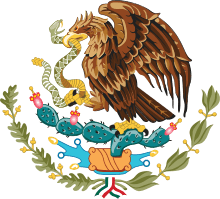Spanish/Lessons/¿Cuándo es tu cumpleaños?
< Spanish < Lessons

Dialogue
- Raúl: ¡Hola, Sofía! Me llamo Raúl. ¿Cuál es la fecha de hoy?
- Sofía: Hola, Raúl. Hoy es el diecisiete de octubre.
- Raúl: Muchas gracias. Mi cumpleaños es el viernes.
- Sofía: ¡Feliz cumpleaños!
- Raúl: Gracias. ¿Cuántos años tienes?
- Sofía: Tengo veinte años.
- Raúl: Vale. Adiós, Sofía.
- Sofía: ¡Hasta luego!
Translation (wait until the end of the lesson).
The numbers
| 0. | Cero | ||||||||||||
| 1. | Uno | 11. | Once | 21. | Veintiuno | 31. | Treinta y uno | 50. | Cincuenta | 600. | Seiscientos | ||
| 2. | Dos | 12. | Doce | 22. | Veintidós | 32. | Treinta y dos | 60. | Sesenta | 700. | Setecientos | ||
| 3. | Tres | 13. | Trece | 23. | Veintitrés | 33. | Treinta y tres | 70. | Setenta | 800. | Ochocientos | ||
| 4. | Cuatro | 14. | Catorce | 24. | Veinticuatro | 34. | Treinta y cuatro | 80. | Ochenta | 900. | Novecientos | ||
| 5. | Cinco | 15. | Quince | 25. | Veinticinco | 35. | Treinta y cinco | 90. | Noventa | 1,000. | Mil | ||
| 6. | Seis | 16. | Dieciséis | 26. | Veintiséis | 36. | Treinta y seis | 100. | Cien | 2,000. | Dos mil | ||
| 7. | Siete | 17. | Diecisiete | 27. | Veintisiete | 37. | Treinta y siete | 200. | Doscientos | 10,000. | Diez mil | ||
| 8. | Ocho | 18. | Dieciocho | 28. | Veintiocho | 38. | Treinta y ocho | 300. | Trescientos | 100,000. | Cien mil | ||
| 9. | Nueve | 19. | Diecinueve | 29. | Veintinueve | 39. | Treinta y nueve | 400. | Cuatrocientos | 101,000. | Ciento un mil | ||
| 10. | Diez | 20. | Veinte | 30. | Treinta | 40. | Cuarenta | 500. | Quinientos | 1,000,000. | Un millón |
Notes
- To form the numbers from thirty to one hundred, you take the multiple of ten below it, then y, then its units value:
"54" Cincuenta y cuatro Like, fifty and four
"72" Setenta y dos Like, seventy and two
"87" Ochenta y siete Like, eighty and seven
- To say one hundred you say just cien, never un cien. To form the numbers from one hundred to two hundred, you turn cien into ciento before adding the rest of the number:
"101" Ciento uno
"128" Ciento veintiocho
"150" Ciento cincuenta
"199" Ciento noventa y nueve
- For numbers between 200 and 900, use the plural "s" (doscientos, ochocientos). Also beware of the usage of these numbers with feminine nouns like the old Spanish currency "peseta". You need to use the feminine agreement then: doscientas pesetas. That agreement has to be observed even when it's in the middle of the number: doscientas veinticinco pesetas.
- When used before a masculine noun, uno becomes un; before a feminine noun, una. To preserve the stress on the last syllable, veintiuno acquires an acute accent when it becomes veintiún before a masculine noun. Note the same mechanism in operation when writing 16 (diez + seis) = dieciséis or 22 (veinte + dos) = veintidós.
- Spanish uses the long count style:
1,000,000,000 mil millones / un millardo (less common)
1,000,000,000,000 un billón
1,000,000,000,000,000 mil billones / un billardo (rare)
1,000,000,000,000,000,000 un trillón
1,000,000,000,000,000,000,000 mil trillones / un trillardo (rare)
1,000,000,000,000,000,000,000,000 un cuatrillón
The rule of thumb is to count how many "millions" are in the digits:
1 (000 000) (000 000) (000 000) is un trillón, because there are three ("tri") multiples of millions.
- Longer numbers:
12,521,008,867,121,403,051 Doce trillones quinientos veintiún mil ocho billones ochocientos sesenta y siete mil ciento veintiún millones cuatrocientos tres mil cincuenta y uno
68,076,564,322,676,958,606 Sesenta y ocho trillones setenta y seis mil quinientos sesenta y cuatro billones trescientos veintidós mil seiscientos setenta y seis millones novecientos cincuenta y ocho mil seiscientos seis
Note that the words millones, billones, trillones are written in plural, but mil (thousand) is always kept in singular, even when counting several thousands. However, if you need to refer to an amount in several thousands without specifying how many, you can use the plural miles (He escrito miles de cartas = I've written thousands of letters). For this same purpose, you can use the synonym millares.
Similarly, there is the plural cientos (He escrito cientos de cartas = I've written hundreds of letters). Centenas and centenares are less common synonyms for cientos.
All those synonyms have forms in singular (Un millar de cartas = One thousand letters; Una centena / Un centenar de cartas = One hundred letters). These synonyms are not used for actually counting, though.
There is also decena, which means a group of ten.
Examples
- Tengo diecisiete gatos
- I have 17 cats.
- Hay treinta y cinco aulas
- There are 35 classrooms.
- Tengo noventa y seis primos.
- I have 96 cousins.
- Hay veintidós estudiantes en esta clase.
- There are 22 students in this class.
- ¡Quiero un caramelo!
- I want a candy!
- ¡Quiero uno!
- I want one!
To declare the presence or existence of something (e.g. "there is," "there are"), Spanish uses hay, which is a special conjugation of the verb haber (to have). Its past form ("there was," "there were") is hubo. Another form in the past (meaning roughly "there used to be") is había. Its future form ("there will be") is habrá. All these forms are invariable in singular and plural: Había un gato aquí, Había dos gatos aquí. Attempting to construct plural forms of them ("habían", "habrán") is a very common error and is severely frowned upon.
How old are you?
To ask someone else's age in Spanish, use Cuántos años, then one of the entries in the table below (¿Cuántos años tienes? means "How old are you?", or more literally, "How many years do you have?")
To say your age in Spanish, you use the irregular verb tener (which means "to have"), then your age, then años (which means "years"). For example, Tengo trece años means "I have 13 years" or "I am 13 years old".
|
Spanish Verb • ¿Cuándo es tu cumpleaños?
| |
|---|---|
| Inglés | Español |
| I have | (Yo) Tengo |
| You (familiar, singular) have | (Tú) Tienes |
| He/She/You (formal, singular)/It has | (Él/Ella/Usted) Tiene |
| We have | (Nosotros) Tenemos |
| You (familar, plural) have | (Vosotros) Tenéis |
| They/You (formal, plural) have | (Ellos/Ellas/Ustedes) Tienen |
- Note
- "Tenéis" would only be used in Spain. In Latin America, one would use "Tienen" for both the second and third plural persons.
- Examples
- Tengo veinte años
- I am 20 years old.
- ¿Cuántos años tienes?
- How old are you?
- Tiene ochenta y siete años.
- He is 87 years old.
- ¿Cuántos años tienen?
- How old are they?
What's the date today?
To ask for the date in Spanish, you use ¿Cuál es la fecha? or ¿Qué día es hoy? (meaning "What is the date?", or "What day is today?"). In reply, you would say Hoy es [day of the week], [date of the month] de [month of the year] (For example, Hoy es martes veinticinco de mayo is "Today is Tuesday, the 25th of May").
|
| ||||||||||||||||||||||||||||||||||||||||||||||
- Notes
- Neither days of the week nor months of the year are capitalised, unless at the beginning of sentences.
- On the first of the month, some Spanish speakers say primero [First] (Hoy es domingo primero de enero).
- You may still find the spelling setiembre in books from the early 20th century. It emerged from the way some countries pronounce the consonants in it. This spelling is not standard usage and you should avoid using it.
- Examples
- ¿Qué fecha es hoy? (¿A qué estamos? is used too.)
- What is the date?
- Hoy es miércoles veintinueve de septiembre.
- Today is Wednesday, the 29th of September
- Hoy es jueves quince de agosto.
- Today is Thursday, the 15th of August.
- Hoy es sábado dos de enero.
- Today is Saturday, the 2nd of January.
When's your birthday?
|
Spanish Vocabulary • ¿Cuándo es tu cumpleaños?
| |
|---|---|
| Inglés | Español |
| When is your birthday? | ¿Cuándo es tu cumpleaños? |
| My birthday is | Mi cumpleaños es |
| On the first of May | El primero de mayo |
| On Wednesday | El miércoles |
| Happy birthday! | ¡Feliz cumpleaños! |
- Examples
- Mi cumpleaños es el once de julio.
- My birthday is on the 11th of July.
- Mi cumpleaños es el ocho de diciembre.
- My birthday is on the 8th of December.
- ¿Cuándo es tu cumpleaños?
- When is your birthday?
- Mi cumpleaños es el sábado.
- My birthday is on Saturday.
Summary
In this lesson, you have learned:
- How to count from cero to one septillion (cero; veintiocho; noventa; cien; un cuatrillón)
- The days of the week (lunes; miércoles; viernes)
- The months of the year (enero; abril; octubre; diciembre)
- How to say your age (Tengo cuarenta años)
- How to ask the age of others (¿Cuántos años tienes?)
- How to say today's date (Hoy es jueves veintinueve de noviembre)
- How to say your birthday (Mi cumpleaños es el primero de agosto; mi cumpleaños es el martes)
- How to ask the birthday of others (¿Cuándo es tu cumpleaños?)
You should now do the exercise related to each section (found here), and translate the dialogue at the top before moving on to lesson 3...
.svg.png) |
¡Aprovéchalo! |
 |